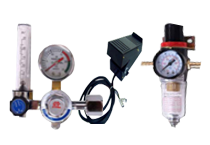
Reducing the noise in the shop
Reducing the noise in the shop.
August 12th, 2013
Every month we try to touch on safety. There’s a wealth of topics we can touch on either briefly or for extended amounts of time. We can revisit old topics and find more information to add. Safety in a welding shop is important, and that’s why we keep revisiting this topic. The effort is worth it, even if we help save only one person from some accident or harm that may be present in a welding shop. This month, we’d like to concentrate on noise reduction in the shop. It’s a serious and hard to control issue. Metal work is loud, whether its material dropping on the floor, a hammer beating on metal, a grinder screeching, or someone is TIG welding in AC. All these sounds can even be combined in a large shop and there’s rarely a rest from it and it can even be nauseating for some people. There are severe short and long term consequences when exposed to these sounds. If you are working in a small shop, likely the control of the noise level is up to you. The most practical way of controlling noise is to wear earplugs. This will reduce the decibel level that reaches your eardrums. It’s effective, but it poses another hazard. It can make you virtually deaf to what going on around you in terms of someone trying to warn you of some other danger or deaf to sounds that would alert you to danger yourself. Some earplugs allow certain sounds through and block the more dangerous ones. These are the type I’d recommend. Another way to reduce noise in the shop is to use acoustic material on the ceiling and walls. This will help absorb the noise and keep it from bouncing and echoing. This may be as simple as insulating your shop instead of leaving bare metal walls. Or it may include installing acoustical tile to absorb the sound. Even painting the concrete floors with a textured material will help. Placing rubber mats under areas that may be prone to falling metal objects will help deaden the “clang”. As I said, noise reduction isn’t easy or cheap. For some it really doesn’t seem practical. But every employee will think otherwise after they discover all or part of their hearing is gone. Safety where hearing is concerned is a difficult topic to cover because there is no “definitive” point at which someone loses their hearing. But you can always be proactive against it. At the very least a good quality set of earplugs should be kept in your shirt pocket.






